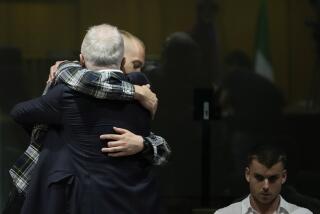S. Africa Court Overturns 21 Murder Verdicts
- Share via
JOHANNESBURG, South Africa — The highest court in South Africa, ending one of the most controversial cases in this country’s history, Wednesday overturned the murder convictions of 21 blacks, including 14 who had been awaiting execution, in the mob murder of a black policeman in 1985.
The case had drawn international attention because 25 defendants had been convicted of murder on the South African legal principle of “common purpose”--for being part of a crowd that tossed rocks at the home of a township policeman who later fled and was stabbed and set afire.
“This judgment has restored everybody’s confidence in the judicial system,” said Andrea Durbach, a Cape Town attorney who represented the defendants, known as the Upington 26. “It was a very brave judgment.”
Several hours after the appeals court judgment Wednesday, 11 men and women walked to freedom from Death Row at Pretoria Central Prison, where they had spent the two years since their convictions. They included Evelina de Bruin, a 56-year-old mother of 10 and South Africa’s only woman on Death Row, and her husband.
“They were pretty bewildered at first, but now they’re ecstatic,” said Durbach. The attorney escorted her clients to a bus for their return to homes in Paballelo township, near Upington.
Judge E. M. Grosskopf, sitting on the appeals court in Bloemfontein, affirmed the murder convictions of three others, but their death sentences were set aside and replaced with prison terms ranging from 10 to 12 years.
The case stemmed from a police confrontation with angry residents in Paballelo, 600 miles southwest of Johannesburg, on Nov. 13, 1985. About 3,000 blacks had gathered on a soccer field to discuss local grievances, and police fired tear gas to disperse them.
Then a crowd of 300 gathered outside the home of Lucas (Jetta) Sethwala, a municipal policeman, and began stoning it. Sethwala fired a shotgun from his window, wounding a child, then fled. He was overtaken and struck over the head with his own gun, stabbed and his body set on fire.
Twenty-six blacks were put on trial for murder and in April, 1989, after a 2 1/2-year trial, 25 were convicted of murder and one of attempted murder. Fourteen were sentenced to hang. It was the most murder convictions, and most death sentences, imposed in a single trial in South African history.
The presiding judge, Jan Basson, determined that only four defendants actually had assaulted the policeman. But he ruled that it was not necessary for the state to prove that all 25 took part in the killing, only that they had “associated themselves with the common purpose” of murder by stoning the man’s house.
However, Grosskopf, the appeals court judge, ruled Wednesday that the evidence had not clearly indicated that all members of the stone-throwing crowd had intended to drive Sethwala from his home and kill him. And he said the composition of the crowd had changed from the time of the stoning to the moment when Sethwala fled.
As a result, he set aside the murder convictions of 21 defendants who were present during the stoning, changing 18 of them to convictions of public violence and commuting those sentences to time served. He upheld three convictions of people who participated in the slaying but reprieved them from Death Row and reduced their sentences. And he also upheld the eight-year sentence of one defendant for murder.
Durbach, the defense attorney, said the ruling indicated that Basson, the trial judge, had inappropriately applied the doctrine of common purpose to the case.
More to Read
Sign up for Essential California
The most important California stories and recommendations in your inbox every morning.
You may occasionally receive promotional content from the Los Angeles Times.













